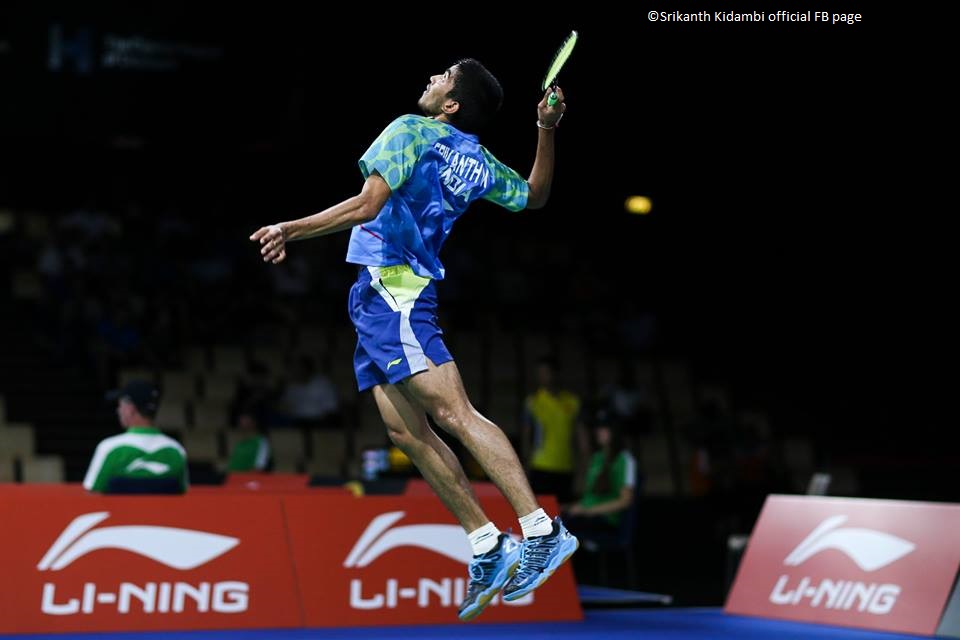Kidambi Srikanth: raising India's Olympic hopes
It seemed straight from a Bollywood movie, when a 21-year old Kidambi Srikanth conquered the mighty Lin Dan in his own backyard to clinch the China Open in 2014. Nobody, in their right mind, would have given the lanky Indian kid a chance against the double Olympic Gold winner.

But, Srikanth displayed his best ever game as he decimated Lin Dan, fondly called the game's 'Lazarus', thanks to his ability to come back from any point in the game, in straight games 21-19, 21-17. The home crowd had an expression of shock and disbelief, while the Indians in the crowd went into raptures.
The Guntur lad was not as renowned as most of his compatriots during his teenage years. Neither did he have national titles to boast of. Nor a stylish crowd-appeasing game. He started playing the game at the age of 8 under Sudhakar Reddy, who spotted him and his brother Nandagopal at an Andhra Pradesh state U-13 championship in 2001. He was known to be skinny and the laziest of the lot at the academy’s boy’s hostel. “Srikanth was a very lazy fellow. He never worked hard and was a poor eater,” said Reddy. “His brother was hard-working. Srikanth is technically very sound on strokes but physically he was very poor and had a lot of room for improvement.” Reddy told Forbes.
The next ten years saw Srikanth running the race- but languishing only as a 'has been'. After another early exit almost ten years later at the singles event of the Junior Nationals, Srikanth seemed to be going nowhere. He had tasted moderate success with a silver medal in the Men’s Doubles and the bronze medal in the mixed doubles at the 2011 Commonwealth Youth Games, but his part-time single career was one unremarkable story.
Then he joined All England Champion Pullela Gopichand's academy. Under the guidance of Gopichand, he switched from part-time singles player to a full-fledged singles player. “During my under-15 and under-17 days, I used to play a lot of doubles,” says Srikanth. “It was Gopi sir’s decision that I should switch from being a doubles player and concentrate only on singles.” Srikanth's career shifted gears overnight.
Two years after his Jaipur loss, he defeated Boonsak Poonsana of Thailand to clinch the Thailand Open. This marked the beginning of a remarkable run as he had just won his first Senior National Championship defeating defending champion P Kashyap in the finals. His knack of rising to the occasion is what caught Gopichand’s attention. “His biggest quality is that he isn’t afraid to play big matches despite going through some early exits in his career,” says Gopichand. “He has an unorthodox game in terms of strokes. That keeps his opponents on their toes all the time.”
He zoomed ahead in the rankings list from a lowly 240th in 2012 to breaking into the top-10 in the world just two years later. Srikanth was ranked 8th in the world in December 2014, majorly due to his famous win in China against Lin Dan, and went through an entire cycle within the top-10 that season. He came back from a first round exit at the prestigious All-England Championships, to script history by becoming the first Indian to win the Swiss Open Grand Prix. His next success was not far away as he defeated Viktor Axelsen in the finals of the Indian Open, to win his first Superseries. These victories helped him climb to his career best ranking. He was ranked 3in the BWF Superseries ranking in April this year.
Since then, his graph has plunged downwards, as the 22-year old has been finding it very difficult to live up to his past. He has fallen at the gates, time and again. And with that, he slid down the rankings ladder to end up at 9.
It all began at the Malaysian Open, when he lost to Tien Houwei of China in the second round. The Singapore Open had a similar result where he faltered against Tanongsak S from Thai, in the second round. At the Chinese Taipei event, he failed to get past against Ihsan Maulana Mustofa from Indonesia, and yet again in the second round.
The losses midway through the season seemed to have a pattern. There seemed to be a loop-hole in his well-structured game. Unforced errors and mental fragility.
The aggressive approach which had helped him before seemed to be going against him now, as his contemporaries had converted his attacking game to their advantage. They would play the simplest of the game and get the better of him. Srikanth is now in a phase through which most of the successful badminton players have passed by. It is the reforms in his game that have changed his fortunes. Previously, Srikanth was an attacking player with some very good deceptive shots. A raw game filled with aggression, power-packed smashes and fast paced rallies. These were the mantras which led to his prominence in the international arena.
Prior to the World Championships, Srikanth had said that he has been trying to curb his attacking instincts, and prolong the rally to tire out his opponents. "The challenge for me now is finding ways to keep my game effective. The attacking game is what works for me. So I can't just abandon that. It has brought me great success but I also realise that I cannot be attacking all the time," Srikanth told Firstpost.
At the world championships he failed to get past the quarters, but there was a different approach with which he played the entire tournament. The natural killer instinct was making way for a simple yet important part called 'patience'. He has been merging his conventional game with a few new aspects which will help him in the long run.
These recent losses are not a major reason to fret about. The re-structuring of his game was in the works for quite some time and its implementation is what we saw during this season. All through the losses, he has been quietly building his game – brick-by-brick and not easily visible to everyone.
It seems part of a calculated risk taken by coach Gopichand earlier this year. “This is a crucial year in that sense. My advice for him would be to put his head down and work hard,” says Gopichand. “There might be a few hitches on the way, but that’s a minor thing. Hard work overcomes everything.”
The series of losses have also played a major role in increasing Srikanth’s mental strength. The exposure to loss at the international level will help him come back stronger in the coming years. The small pinch of patience, which he has incorporated into his game, has been the missing Midas touch.
As they say “The night is the darkest just before the dawn” and it looks like the time is too not far. The coming year, being an Olympic year, is the perfect stage for Srikanth to break out and grab that elusive Olympic medal - which would be the first for men’s badminton for India.

Comments
Sign up or log in to your account to leave comments and reactions
0 Comments